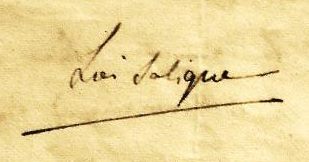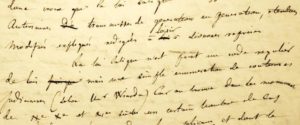Gustave FLAUBERT (1821-1880). Loi salique. Manuscript autograph, [Rouen, 1837]. 2 pp. in folio. Beautifully slipcase by Benjamin Elbel.
Exceptional unpublished manuscript, probably written in September 1837, while Flaubert, fifteen years old, ended his holiday in Rouen, before he returns to second grade. These are his reading notes on the 9th lesson of the Cours d’Histoire moderne of François Guizot, whose name he inscribed at the top left, above that of Montesquieu ; he will read the article on the same subject in L’Esprit des lois.
These notes on Guizot will be used by the young Gustave for his book entitled Lutte du Sacerdoce et de l’Empire, that Conard catalogs as unpublished, and only gives the plan. See Gustave Flaubert, Œuvres de jeunesse inédites, vol. III, p. 319-320 (in Œuvres Complètes, vol. XIII, . Conard, Paris, 1910). The work is now published by Gallimard in 2001 , Bibiothèque de la Pléiade, Œuvres de jeunesse, Œuvres complètes, I, Appendices III, p. 1137-1165. The manuscript of Lutte du sacerdoce et de l’Empire is preserved in Texas, University of Austin, Humanities Research Center.
Flaubert quotes, paraphrase or summarizes the course that Guizot had published a few years earlier in his Cours d’Histoire moderne. Histoire de la Civilisation en France depuis la chute de l’empire romain jusqu’en 1789, Paris, Pichon et Didier, 1829, Volume I, 9ème leçon.
It is remarkable that the young student did not accept the many moral considerations set out by the great historian.
We find references about La Lutte du sacerdoce et de l’empire only once in Flaubert’s correspondence, in a letter to his friend Ernest Chevalier, on 22 or 23 septembre 1837. At the time, he was 15 years old and finished his third-grade class. In this letter, Flaubert writes : ” … we have only a few days left to get to the holiday’s end. I will use them to work vigorously to finish with two things, one of which bothers me and the 2nd amuses me. This is my historical sketch on La Lutte du sacerdoce et de l’empire. Chéruel on leaving had told me : with the plan you have formed[you’ll need] at least 2 good months and I did almost nothing . In 8 days however the task will be sloppy. “
At the Royal College of Rouen, where he was then internal, Flaubert was taking the history classes of Adolphe Chéruel. In 1836-1837, he was in third degree, with the Middle Ages on the program. Chéruel was himself an ancient pupil of the college, and student of Michelet. Later he will be known for his Dictionnaire Historique des institutions, mœurs et coutumes de la France, (Paris, Hachette, 2 vol. in-8°, 1855). In his letters from the years 1836-1838, Flaubert talks about Chéruel two or three times. He says how much he likes the work he does for him. On 24 June 1837 he evokes this direction : ” now that I don’t write anymore, that I became a historian (supposedly) ” and on 30 November 1838 : ” I make […] historical studies for Chéruel and smokes pipes for my particular interest “. As a student of Chéruel, Flaubert made summaries and sometimes dealt freely with broad issues, including the Lutte du Sacerdoce et de l’Empire.
L’Inventaire Bidault, published by René Rouault de la Vigne, does not include any of the works used by the teenager, at least in an edition before May 1837 ; it can be assumed that Flaubert borrowed books from Chéruel, from friends, or that he worked at the library in the city of Rouen. We realize that the works of modern historians he uses (Guizot, Hallam, Michelet and Thierry) are relatively recent, having all been published in the decade before his essay was written. (Cf. J. Frey : Un inédit de Flaubert : la « Lutte du Sacerdoce et de l’Empire » (1837), in the Revue d’Histoire littéraire de la France, juillet-octobre 1981, pp. 702-719). It should be noted that seven volumes of Essais sur l’Histoire de France by François Guizot are included in the inventory after the death of the author of Madame Bovary.
Precious unpublished document.
6 000 €




